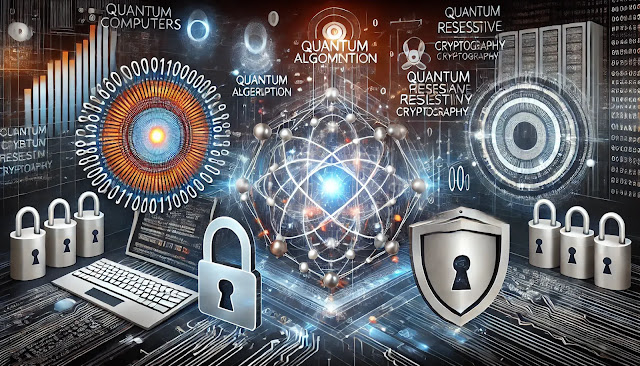Understanding the Impact of Quantum Computing on Cybersecurity
Quantum computing is poised to revolutionize various industries, but one of the areas where its impact will be most profound is cybersecurity. With the ability to process complex calculations exponentially faster than classical computers, quantum computers have the potential to break many of the encryption methods that protect today’s digital systems. As we enter the quantum era, understanding its implications for cybersecurity is crucial for organizations and governments alike. Here’s how quantum computing is expected to reshape cybersecurity and what can be done to mitigate the risks.
1. Breaking Traditional Encryption
At the heart of modern cybersecurity lies encryption, particularly asymmetric encryption algorithms like RSA and Elliptic Curve Cryptography (ECC), which protect sensitive data by using two keys: one public and one private. The security of these algorithms is based on the difficulty of solving certain mathematical problems—such as factoring large prime numbers—which classical computers find nearly impossible to break.
However, quantum computers, with their ability to perform calculations at lightning speed, could crack these encryption methods in a matter of hours or minutes. Shor’s algorithm, a quantum algorithm, can efficiently factor large numbers, rendering RSA and ECC vulnerable to quantum attacks. This poses a significant risk to the vast amount of data that relies on these encryption methods, from online banking transactions to classified government communications.
2. Quantum-Resistant Cryptography
To counter the threat posed by quantum computing, researchers are developing post-quantum cryptography (PQC) algorithms that are designed to withstand attacks from quantum computers. These quantum-resistant algorithms focus on mathematical problems that remain difficult for quantum computers to solve, even with their advanced processing power.
Organizations must begin transitioning to quantum-resistant cryptographic methods sooner rather than later. The National Institute of Standards and Technology (NIST) is already working on standardizing post-quantum cryptographic algorithms, with the goal of ensuring that sensitive data remains secure in the quantum era.
3. Quantum Key Distribution (QKD)
While quantum computing poses a threat to traditional cryptography, it also offers new opportunities for enhancing security. Quantum Key Distribution (QKD) is a technique that uses the principles of quantum mechanics to securely exchange encryption keys between parties. QKD relies on the fact that any attempt to eavesdrop on a quantum communication would disturb the quantum states, alerting the communicating parties to the breach.
QKD could play a key role in securing communications in the future, particularly for sensitive industries such as defense, finance, and healthcare. Although still in its early stages, QKD holds promise for creating secure communication channels in a quantum-enabled world.
4. Threats to Digital Signatures and Blockchain
Quantum computing could also undermine the security of digital signatures and blockchain technology. Digital signatures, which rely on cryptographic algorithms to verify the authenticity of data or transactions, are used in everything from software updates to cryptocurrency transactions. Blockchain, which relies on digital signatures to secure its decentralized ledger, could be particularly vulnerable to quantum attacks.
Without proper safeguards, quantum computers could potentially forge digital signatures or manipulate blockchain transactions, leading to massive security breaches. To counter this, the development of quantum-resistant digital signatures and blockchain protocols is already underway.
5. Quantum Computing for Defensive Security
While quantum computing poses significant threats, it can also enhance defensive cybersecurity strategies. Quantum computers could be used to improve threat detection, pattern recognition, and anomaly detection, identifying potential breaches much faster than classical systems. In fields like AI-driven cybersecurity, quantum computing could revolutionize the way organizations defend against evolving cyber threats by analyzing large datasets and patterns in real-time.
6. Preparing for a Quantum Future
The full impact of quantum computing on cybersecurity may still be years away, but organizations need to start preparing now. Steps to take include:
- Transitioning to post-quantum cryptography: Begin adopting quantum-resistant encryption algorithms to ensure sensitive data remains secure in the future.
- Evaluating the security of legacy systems: Identify vulnerabilities in existing systems that could be compromised by quantum computers.
- Investing in QKD research: Explore opportunities for adopting Quantum Key Distribution as a means of securing communications.
- Staying informed about quantum advancements: Keep up-to-date with the latest developments in quantum computing and cybersecurity to stay ahead of potential threats.
Conclusion
Quantum computing has the potential to upend the foundations of modern cybersecurity, rendering many of today’s encryption methods obsolete. While the quantum era brings unprecedented risks, it also opens up new opportunities for enhancing security through quantum-resistant cryptography and quantum key distribution. By preparing now, organizations can navigate the challenges and opportunities posed by quantum computing and safeguard their digital infrastructure in the quantum future.







0 Comments